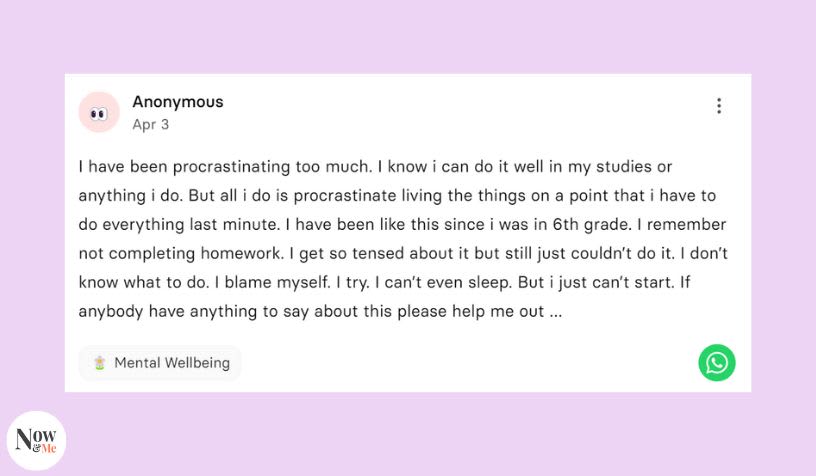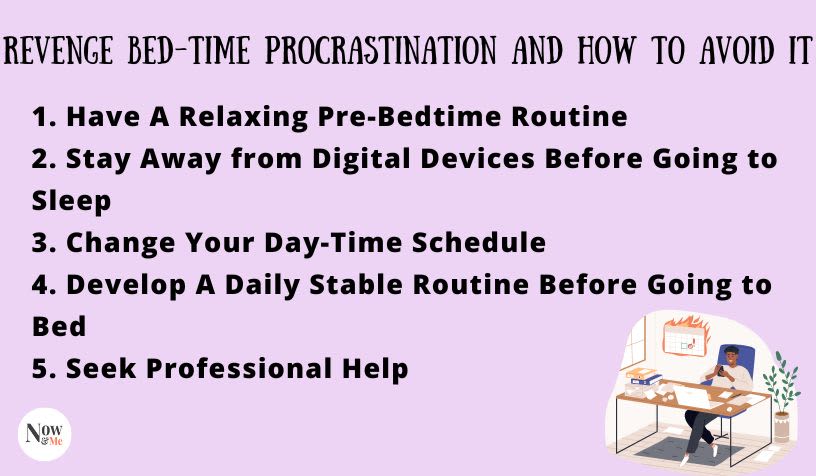We've all heard the phrase "procrastination is the thief of time" at some point in our lives. People like us, who usually put things off till the last minute, are the ones who can relate the most. (Wait, what? I'm also writing this blog at the last possible moment before submission, haha). That, however, is just a classic case of chronic procrastination, which almost everyone is aware of and most of us indulge in on a daily basis. But what about bedtime procrastination, or revenge bedtime procrastination?
Let's imagine you've just gotten home from a hard day at work, exhausted and burned out, but you're still willing to put off going to bed to enjoy some "me-time." For example, leisurely watching Netflix or browsing the internet. This is called revenge bedtime procrastination, or in simpler words, sleep procrastination.
As the name implies, it entails postponing sleep in order to gain control over your life at night, as you cannot control your life during the day. It means you obtain "revenge" for your hectic daytime routine by cramming leisure time into your schedule at the expense of sleep. Let's dig deep into the concept of this newfound type of procrastination, which has recently taken social media into a storm.
Causes of Revenge Bed-Time Procrastination
The answer lies in the term "revenge" itself. Bedtime procrastination is considered a form of "revenge" for having little or no free time during the day. So, the main cause is to reclaim your independence and your valuable personal time that you can't have throughout the day.
People who procrastinate at bedtime know they should get enough sleep and generally want to, but they don't. It's more like they don't succeed in doing so. However, there are a variety of other elements that can contribute to this behaviour. For example, if you are a "night owl" rather than an "early bird," you may strive to turn those late-night hours into productive time because you know you won't be able to get up early anyhow.
Another common reason for procrastination is a lack of self-control or self-regulation. It could be caused by one or more of these factors, or by something else entirely. It's also plausible that people who procrastinate at night are more likely to procrastinate in general.
The Adverse Effects of Revenge Nighttime Procrastination
Sleep deprivation can have a wide range of negative consequences. You are more likely to develop a variety of physical and mental health problems if you do not get enough sleep. Because you are not receiving sufficient rest, your emotional health will suffer as well.
Some symptoms can be like:
- Less attention span,
- slower thinking,
- poor memory,
- unpleasant mood,
- concentration difficulties,
- depression
- inability to make sound decisions,
- anxiety, and so on.
Anxiety and procrastination have a direct relationship. You become anxious knowing that you might be late getting up tomorrow and still not be able to sleep. This might cause a lot of anxiety and mental stress and, in turn, create mental health issues.
Some physiological problems it can lead to are:
- Cardiac diseases,
- Weaker immunity,
- High blood pressure
- Hormonal issues
- Chronic body pain, and many more.
What's the most terrifying part? Long-term practice of revenge bedtime procrastination may raise your chances of a shorter lifespan.
5 Effective Ways to Prevent Bed-Time Procrastination
Now that we know how bad the repercussions of sleeping late can be, let's look at 5 ways to avoid procrastination and save ourselves from some pretty horrible nightmares in the future.
1. Have A Relaxing Pre-Bedtime Routine
Doing something that soothes your mind and body can really encourage you to sleep well. You can have a relaxing talk with your partner, telling each other about your days. Alternatively, you can eat your favourite comfort food and read a book that relaxes you and allows you to dream at night. Anything that makes you want to sleep can be incorporated into your relaxing ritual before bedtime. In your bedroom, good music and ambient lighting can also help you relax.
2. Stay Away from Digital Devices Before Going to Sleep
Getting on your phone or pc before going to bed, catching up with your friends online, or scrolling through social media mindlessly might sound like a pleasant idea. Except, it isn't. The blue light emitted from the devices causes a lot of disturbance in the sleep cycle. It reduces the production of melatonin in your body. This hormone makes you feel tired and ready for bed. Less production of this hormone messes up your sleep cycle and health. Keep your digital devices away for a while before going to sleep, and it will allow you to have the quality of sleep that you need.
3. Change Your Day-Time Schedule
Shift your schedule a little, revise your day-to-day activities and modify your lifestyle. Instead of enjoying your leisurely "me time" at night by cutting down on your sleep, get some quality in the day and get a good night's sleep without any holdbacks. Revenge bedtime procrastination has a massive impact on your lifestyle as insufficient sleep brings about huge changes mentally and physically. To overcome procrastination and get your well-needed sleep, cut out the unimportant activities that take up all your free time. It might be hard rearranging and letting go of some of your daily activities, but this will let you indulge in things that you love to do and have a proper night's sleep without sacrificing any of it.
4. Develop A Daily Stable Routine Before Going to Bed
Having a stable routine will help your body relax easily. Frequent changes in your lifestyle stress your body more than what it may look like. Develop a stable routine and go to bed at a fixed time every day; try to avoid making changes or exceptions. Make sure not to skip any activity that you do on a daily basis before going to bed. Similarly, steer clear of any extra task at night that can change your routine. Revenge bedtime procrastination may develop into insomnia after a certain period of negligence toward your health. Taking precautions early on will prevent such things from happening.
5. Seek Professional Help
Even after trying everything that you could to stop procrastinating on sleep, you can get professional help to get back on track. Now&Me has introduced Therapy&Me to help you through the entire process. From getting the perfect therapist who will be a perfect match for you to setting up the perfect rest and leisure routine, your life will be a lot better after consulting and getting help. You can get rid of revenge bedtime procrastination, all you need is the willingness to live a happy and healthy life.
Release Your Stress on Now&Me
Revenge bedtime procrastination might have a negative impact on your mental health. Now&Me provides a safe environment for you to vent when you feel like life is out of your control. In a network of compassionate strangers, share your emotions and open up about your everyday challenges, anonymously if you choose.
Express your thoughts and find the peace you were seeking all this while on an online platform free of cost. Whatever your emotions might be, there is a safe space for them on Now&Me. You may also reach out to our expert mental health therapists in Therapy&Me if you think venting isn't enough and you need professional treatment to overcome your poor sleep habits.
It's excellent to be aware of your condition, but what truly matters are the steps you take to address it.
FAQs
1. What Is Structured Procrastination?
Prioritising the trouble-free tasks from the list of things to do and avoiding doing the more tedious ones till the last moment possible is called structured procrastination. Instead of wasting your time while procrastinating, you keep doing the tasks that you inevitably have to get over with and keep the ones that you are dreading for some other time. It is also known as productive procrastination.
2. What Is Procrastination Psychology?
There can be many psychological reasons for procrastination. The reasons can be a lack of confidence in yourself, lack of interest in the task, and therefore motivation. You can procrastinate a grinding task because you may not be able to complete it in the end. Not wanting to face defeat can also be a reason for you to delay a task.
3. What Is The Difference Between Perfectionism and Procrastination?
Perfectionism is the fear of not being able to complete a task that you have taken as it may be a sign of incompetence and imperfection. Whereas, procrastination is putting off a task at hand because of a lack of confidence or motivation. Perfectionists sometimes indulge in procrastination for they fear that they will fail to complete a task and avoid doing it.

